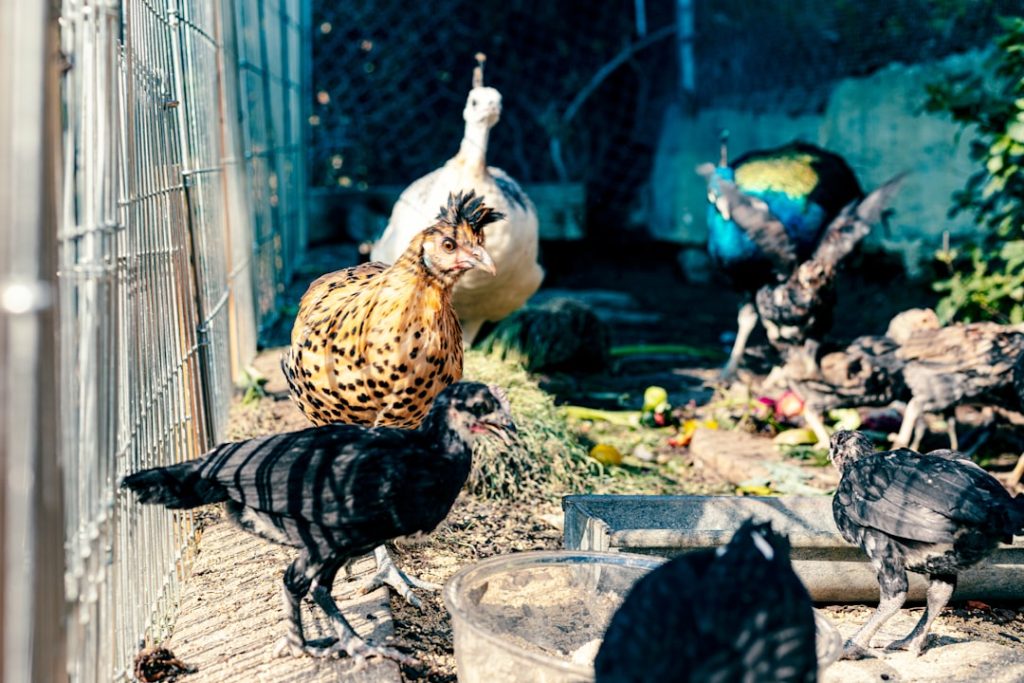Keeping chickens offers numerous benefits and can be a rewarding experience. Chickens provide a reliable source of fresh, high-quality eggs, which are often considered superior to store-bought alternatives due to the birds’ free-range lifestyle and natural diet. For those interested in self-sufficiency, chickens can also serve as a source of meat.
Chickens contribute to garden maintenance by controlling insect populations, as they consume various bugs. Their droppings serve as an effective fertilizer, enhancing soil quality and promoting plant growth. As pets, chickens offer companionship and entertainment, displaying unique personalities and behaviors.
Raising chickens can be an educational opportunity for children, teaching them about responsibility, animal care, and food production. This experience fosters an appreciation for nature and the environment while introducing concepts of sustainable living and the life cycle. The process of keeping chickens imparts valuable skills and instills important values in young people.
Table of Contents
Key Takeaways
- Keeping chickens can provide a sustainable source of fresh eggs and natural pest control in your backyard.
- It is important to be aware of local regulations and zoning laws before keeping chickens to avoid potential fines or legal issues.
- Health and safety considerations for keeping chickens include proper sanitation, disease prevention, and predator protection.
- Potential costs and responsibilities of keeping chickens include initial setup, ongoing care, and maintenance of coop and supplies.
- Registering your chickens may involve obtaining permits, licenses, or inspections from local authorities to ensure compliance with regulations.
- Consequences of not registering your chickens may result in fines, penalties, or even having to remove the chickens from your property.
- Resources for chicken owners may include local poultry associations, online forums, and educational workshops for support and information.
Local Regulations and Zoning Laws
Understanding Local Ordinances
Many cities and towns have specific ordinances regarding the keeping of chickens, including rules about the number of chickens allowed, coop requirements, and distance from neighboring properties. It is crucial to familiarize yourself with these regulations to ensure that you are in compliance with the law.
Homeowners’ Associations and Neighborhood Covenants
In addition, some homeowners’ associations may have their own rules and restrictions regarding the keeping of chickens. It is important to review any neighborhood covenants or restrictions before bringing chickens onto your property. Failure to comply with local regulations and zoning laws can result in fines or other legal consequences, so it is crucial to do your due diligence before starting a backyard flock.
Considering Your Neighbors
Furthermore, it is essential to consider the potential impact of keeping chickens on your neighbors. Some people may have concerns about noise, odors, or other issues related to backyard chickens. It is important to be considerate of your neighbors and address any potential concerns they may have. Open communication and cooperation with neighbors can help ensure a positive experience for everyone involved.
Health and Safety Considerations

When keeping chickens, it is important to prioritize their health and safety. This includes providing a clean and secure coop for them to live in, as well as access to fresh water and nutritious food. Regular cleaning and maintenance of the coop are essential for preventing the spread of disease and ensuring the well-being of the chickens.
In addition, it is important to be aware of common health issues that can affect chickens, such as parasites, respiratory infections, and injuries. Regular health checks and observation of the chickens can help identify any potential problems early on. It is also important to have a plan in place for veterinary care in case of illness or injury.
Furthermore, it is important to take precautions to protect chickens from predators, such as raccoons, foxes, and birds of prey. This may involve installing secure fencing around the coop and using predator-proof latches on doors and windows. Additionally, providing a safe outdoor space for the chickens to roam during the day can help reduce the risk of predator attacks.
Potential Costs and Responsibilities
Keeping chickens comes with its own set of costs and responsibilities that should be carefully considered before starting a backyard flock. The initial investment in setting up a coop, purchasing feeders and waterers, and acquiring chickens can add up quickly. In addition, ongoing costs such as feed, bedding, and veterinary care should be factored into the budget.
Furthermore, it is important to consider the time and effort required to care for chickens on a daily basis. This includes feeding and watering them, cleaning the coop, collecting eggs, and monitoring their health. Chickens require regular attention and care, so it is important to be prepared for the responsibilities that come with keeping them.
In addition, it is important to consider the long-term commitment involved in keeping chickens. Chickens can live for several years, so it is important to be prepared for the ongoing care and maintenance they will require. Before starting a backyard flock, it is important to carefully consider whether you have the time, resources, and commitment to properly care for chickens.
Registering Your Chickens: The Process
In some areas, it may be necessary to register your chickens with local authorities before keeping them on your property. The process for registering chickens can vary depending on where you live, so it is important to research the specific requirements in your area. This may involve filling out an application, paying a fee, and providing information about the number of chickens you plan to keep.
In addition to registering your chickens, you may also need to obtain permits or licenses for keeping poultry on your property. This may involve meeting certain requirements regarding coop size, distance from neighboring properties, and other factors related to the health and safety of the chickens. Furthermore, it is important to keep accurate records of your chickens, including their breed, age, and any health-related information.
This can be helpful for tracking their care and monitoring their well-being over time. Keeping detailed records can also be useful in the event of any disputes or legal issues related to your backyard flock.
Consequences of Not Registering

Legal Consequences
Failing to register your chickens or comply with local regulations can result in legal consequences, including fines or other penalties. In severe cases, authorities may require you to remove the chickens from your property if you are found to be in violation of local laws. This can be a costly and disruptive process that can be avoided by taking the time to properly register your chickens and comply with local regulations.
Strained Relationships
Not registering your chickens can also lead to strained relationships with neighbors or homeowners’ associations. If neighbors have concerns about your backyard flock or if they feel that you are not complying with local regulations, it can create tension and conflict within the community. Open communication and cooperation with neighbors can help prevent these issues from arising.
Risks to Health and Safety
Furthermore, not registering your chickens can also pose risks to their health and safety. Without proper registration and compliance with local regulations, it may be more difficult to access veterinary care or other resources that can help ensure the well-being of your chickens. By taking the time to properly register your chickens and comply with local laws, you can help ensure a positive experience for both yourself and your backyard flock.
Resources for Chicken Owners
For those considering keeping chickens or already have a backyard flock, there are many resources available to help support chicken owners. Local agricultural extension offices or poultry associations may offer workshops or educational materials on topics such as coop design, chicken health care, and predator control. In addition, there are many online forums and communities where chicken owners can connect with others who share their interest in raising poultry.
These platforms can be valuable sources of information and support for new and experienced chicken owners alike. Furthermore, there are numerous books and publications available on the topic of keeping chickens, covering everything from breed selection to coop construction to egg production. These resources can provide valuable guidance and inspiration for those interested in starting or expanding their backyard flock.
Overall, keeping chickens can be a rewarding experience that offers a variety of benefits, but it is important to carefully consider the potential costs and responsibilities involved. By familiarizing yourself with local regulations and zoning laws, prioritizing the health and safety of your chickens, and taking the time to properly register your flock, you can help ensure a positive experience for both yourself and your feathered friends. With the right resources and support, keeping chickens can be an enjoyable and fulfilling endeavor for many people.
If you’re considering keeping chickens, you may be wondering if you need to register them. According to a helpful article on Poultry Wizard, it’s important to check your local regulations and requirements for keeping chickens. They provide valuable information on chicken coop and run plans, A-frame chicken coop designs, and where to place your chicken coop to ensure the health and safety of your flock. For more information, you can check out their article on whether or not you need to register your chickens.
FAQs
What are the regulations for keeping chickens?
In many areas, there are regulations and ordinances that govern the keeping of chickens. These regulations may include rules about the number of chickens allowed, coop requirements, and distance from neighboring properties.
Do I need to register to keep chickens?
In some areas, you may be required to register your chickens with local authorities. This registration process helps ensure that you are in compliance with any regulations and allows for proper oversight of the chicken population in your area.
What are the benefits of registering my chickens?
Registering your chickens can help you stay informed about any changes in regulations or requirements for keeping chickens in your area. It can also provide a record of your compliance with local laws, which may be helpful in the event of any disputes or issues.
What happens if I don’t register my chickens?
Failure to register your chickens in an area where it is required may result in fines or other penalties. It’s important to familiarize yourself with the regulations in your area and comply with any registration requirements to avoid potential consequences.
How do I find out if I need to register my chickens?
To find out if you need to register your chickens, you can contact your local animal control office, zoning department, or agricultural extension office. They can provide you with information about any regulations or requirements for keeping chickens in your area.
Meet Walter, the feathered-friend fanatic of Florida! Nestled in the sunshine state, Walter struts through life with his feathered companions, clucking his way to happiness. With a coop that’s fancier than a five-star hotel, he’s the Don Juan of the chicken world. When he’s not teaching his hens to do the cha-cha, you’ll find him in a heated debate with his prized rooster, Sir Clucks-a-Lot. Walter’s poultry passion is no yolk; he’s the sunny-side-up guy you never knew you needed in your flock of friends!







